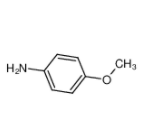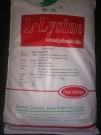P-Anisidine

Brief introduction
para-Anisidine (p-anisidine), a grey-brown solid, is the most toxic of the three isomers of anisidine and causes blood damage upon oral ingestion, inhalation or skin contact. If heated strongly, it may release very toxic fumes of nitrogen oxides.
p-Anisidine reacts with secondary oxidation products such as aldehydes and ketones in fats and oils to form products that absorb at 350 nm wavelength of light; therefore, it is used as an official method for detecting them by the American Oil Chemists' Society. It is particularly good at detecting unsaturated aldehydes, which are the ones that are most likely to generate unacceptable flavors, making it particularly useful in food quality testing.
Essential information
Chinese name | 对氨基苯甲醚 | English name | p-Anisidine |
CAS number | 104-94-9 | Molecular formula | C7H9NO |
molecular weight | 123.15200 | Precise quality | 123.06800 |
Physicochemical properties
Appearance and properties: white, molten crystalline solid, unique amine smell
Density: 1.06
Boiling point: 240-243 °C
Melting point: 56-59 °C
Flash point: 122 °C
Security information
Customs Code: 2921420090
Purpose
It is used in the dye industry to prepare ice dye. It is an intermediate of jujube GP, blue salt VB, chromophenol as-rl, chromophenol as-sg, C.I. disperse blue 79 and indomethacin, adipine, primaquine and other pharmaceuticals. Biochemical research, organic synthesis.




